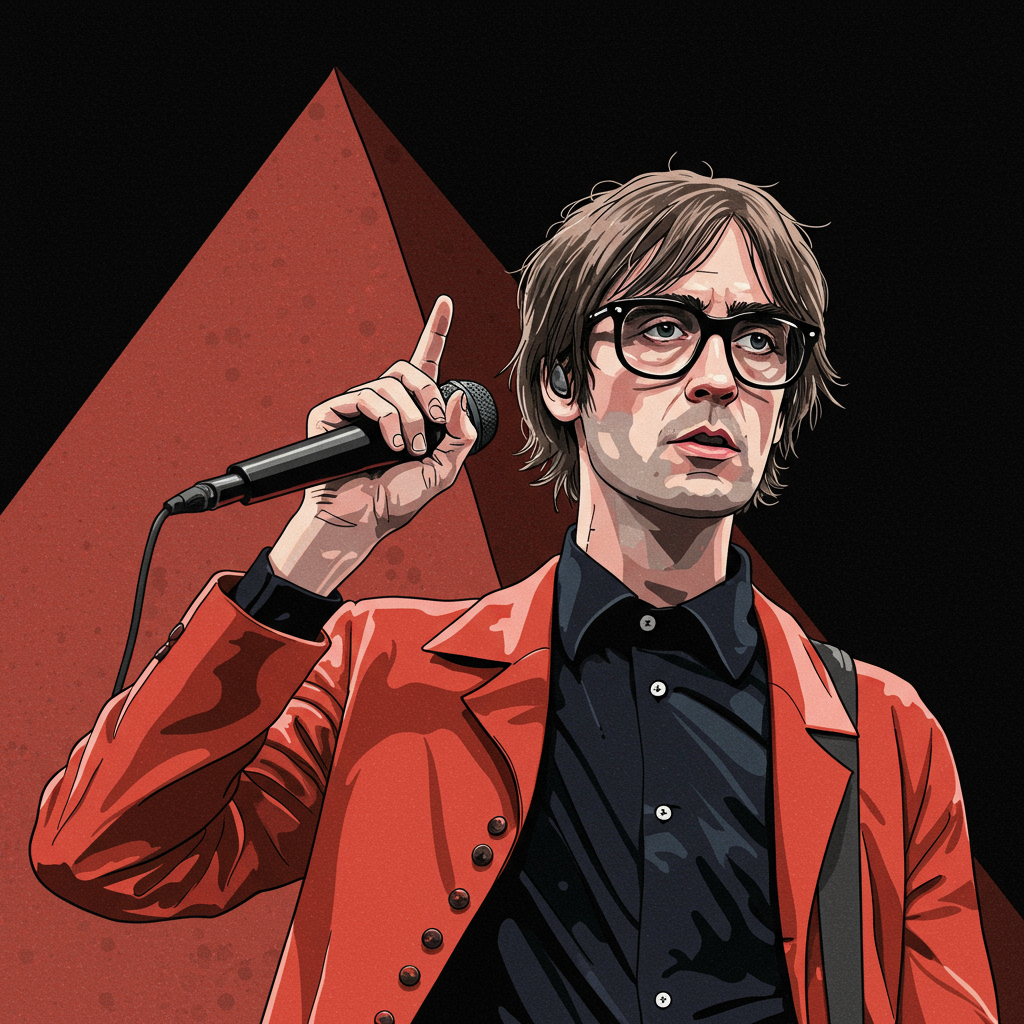Glastonbury Festival is famous for its surprises. Yet, few drew as much fervent speculation as the cryptic “Patchwork” listing on the 2025 bill. Fans correctly guessed this masked identity: Pulp. their return to the iconic Pyramid stage, exactly 30 years after their landmark 1995 headline performance, wasn’t just a concert. It was a powerful statement confirming their unique place in music history. This wasn’t just nostalgia. It was a vivid demonstration of a band that remains defiantly themselves, connecting deeply with both long-time devotees and new admirers.
The Secret’s Out: Pulp Arrives
The air buzzed with anticipation. Despite keyboardist Candida Doyle’s clever deflection in a local paper – claiming Glastonbury “weren’t interested” – the packed Pyramid Stage told the true story. A “headlining-set heaving” crowd had gathered. They knew. Frontman Jarvis Cocker himself acknowledged the playful deception early on. “Sorry for people who were expecting Patchwork,” he quipped from the stage. He marvelled at how everyone seemed to figure it out. This shared secret added an extra layer of excitement to an already monumental occasion.
Still Standing Apart: A Distinct Sound and Voice
Pulp kicked off the set with “Sorted For E’s & Wizz.” This choice immediately signalled their enduring contrarian spirit. The song offers a “steely view” of festival hedonism. It highlighted the band’s refusal to take the straightforward path. As they launched into hits like “Mis‐Shapes,” “Disco 2000,” and “Babies,” the contrast with their Britpop peers became starkly evident.
Their sound was never conventional. It was a “wonky collision.” Elements of 70s glam, French pop, disco, and analogue electronics blended uniquely. This wasn’t the guitar-driven anthems dominating the era. Lyrically, too, they were different. Their songs were consistently “darker and grubbier.” They championed “oddballs and outsiders.” This stood against a backdrop where alternative music chased mainstream acceptance. Pulp’s massive success felt almost accidental. They weren’t part of a scene’s wave. They simply were.
Why Pulp’s Music Feels Timeless
This distinct identity is key to their longevity. Unlike many bands tied to the 90s sound, Pulp’s music wasn’t “welded to the era.” Their unconventional style meant their songs haven’t “dated.” They sound fresh because they never sounded quite like anything else. This timelessness was clear throughout the set. Newer tracks like “Spike Island” and “Got To Have Love” from their comeback album More fit seamlessly. They represented a “smart reapplication” of Pulp’s core approach to later life experiences. There was “no diminution in quality.” The band demonstrated their enduring relevance.
Jarvis: The Master of Ceremonies
Much of Pulp’s enduring appeal rests on Jarvis Cocker. He remains a magnetic and “fantastic frontman.” His stage presence is captivating. He weaves insightful commentary between songs. He offered “sage wisdom” about the festival itself. “To enjoy Glastonbury,” he advised, “you have to submit to it.”
He also reflected on the band’s history. He recalled the terror of filling in for The Stone Roses in 1995 with only days’ notice. “But I feel very relaxed today,” he told the massive crowd, smiling. “How about you?” This easy connection with the audience is a Pulp hallmark. It turns a large festival gig into something personal and intimate. His interactions highlighted the journey the band and their fans have shared over three decades.
The Power of Shared Emotion
The audience reaction underscored this bond. Many onlookers were visibly “misty-eyed” during the classic songs. It wasn’t just nostalgia for the 90s. It was an emotional connection to songs that spoke to their own experiences as outsiders or individuals. Pulp’s music validates feelings of not quite fitting in. Seeing these anthems performed live again ignited a shared sense of belonging. The set was a testament to the powerful, lasting impact music can have on our lives and identities.
The Anthem’s Roar: Common People
You know a set is building to something special when “Common People” is waiting. It’s arguably “the most straightforwardly rousing anthem ever written about class rage.” As the band launched into it, the crowd erupted. The resulting “delirium” was immense. It mirrored the energy seen in old footage of their 1995 headlining set. It was undoubtedly “one of the most joyous moments so far” at Glastonbury 2025.
Adding to the surreal moment, the Red Arrows performed a flypast midway through the song. This unplanned spectacle made an already legendary performance even more unforgettable. Pulp exited the stage leaving the audience buzzing. Jarvis promised to see them in Arcadia later, maintaining that unique Cocker charm. The set was a triumphant reminder of their status.
A Legacy Reaffirmed
Pulp’s Glastonbury return was more than a nostalgia act. It reaffirmed their status as icons. It proved their music resonates across generations. The “Patchwork” mystery drew a global audience. It showed nostalgia’s significant pull in the music scene. However, Pulp’s performance also highlighted why they endure. Their unique sound, lyrical depth, and championing of the outsider spirit set them apart.
This set provokes thought about the music industry. Can nostalgia drive future trends? How do older bands stay relevant? Pulp’s show offered a compelling answer. By staying true to their core identity while incorporating new material, they showed timeless appeal. They demonstrated how iconic artists can connect with younger listeners. Pulp’s 2025 set was a brilliant showcase. It cemented their place as the “magnificently misshapen oddballs” whose music continues to shine brightly. It suggests surprise reunions and nostalgic performances might become more common, with artists embracing their past.
Frequently Asked Questions
What was Pulp’s secret name on the Glastonbury 2025 bill?
Pulp’s appearance was hidden under the mysterious name “Patchwork.” This cryptic listing fueled speculation among festival-goers and the media. Frontman Jarvis Cocker humorously referenced the name during their set. Despite the band’s attempts at secrecy, the widespread rumour ensured a massive crowd gathered.
Which stage did Pulp play for their surprise Glastonbury 2025 set?
Pulp performed their highly anticipated secret set on the main Pyramid Stage at Glastonbury. This was particularly significant as it marked their return to headlining that specific stage after exactly 30 years, following their legendary performance there in 1995 when they famously stepped in for The Stone Roses.
How did Pulp’s Glastonbury 2025 set compare to their 1995 show?
The 2025 set evoked similar levels of crowd delirium and devotion as their iconic 1995 performance. While 1995 captured their ascendancy, the 2025 show demonstrated their enduring relevance and relaxed confidence. The setlist included beloved classics that caused misty eyes, culminating in “Common People,” which generated excitement comparable to its impact 30 years prior.


